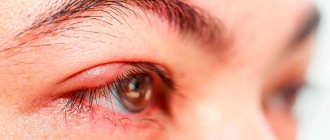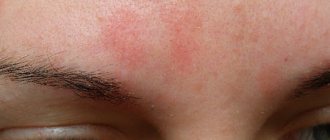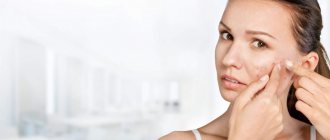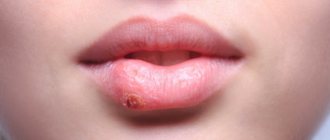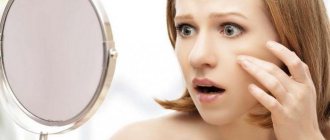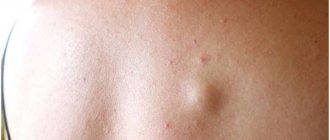If, after a wild party, you have red spots on your face and hives appear on your body, this may be an allergy to alcohol. And although this fact is surprising to many people, an allergic reaction to alcoholic beverages is a very common phenomenon.
Few people know, but...
According to some reports, 7% of people, or approximately one in fifteen, are allergic to alcohol.
A few more numbers: since school years we have known that a person consists of 70% water, but teachers do not tell us that we have... about 0.19 ‰ of endogenous alcohol.
Note to car enthusiasts
Prolonged oxygen starvation, chronic diseases of the kidneys, lungs and liver, central nervous system and diabetes mellitus can provoke an increase in endogenous ethyl alcohol in the blood!
Ethanol is formed in the cells of the body as a result of various biochemical reactions and in the intestines during the digestion of food. How can an allergy to alcohol occur to a substance that is present in our body almost “from the cradle”?
So, let's try to figure it out - is there an allergy to alcohol?
Internal ethyl alcohol is a compound necessary for metabolism and energy, which regulates the permeability of cell membranes and helps the body adapt to stressful situations. So can you be allergic to internal alcohol? In fact, no, because it is the “brainchild” of the organism itself.
More often, allergies occur from alcohol taken orally. Theoretically, such reactions of the body are possible to all types of alcoholic products.
It is difficult to say when the first alcoholic drink appeared, perhaps at the same time as the first dishes. Our distant ancestors created the first varieties of wine and beer from grapes, honey and fruits.
Pure alcohol was obtained by alchemists in the Middle Ages and was called “alcohol,” which means “intoxicating” in Arabic. Did you already have an allergy after drinking alcohol? History is silent about this, but modern alcoholic drinks quite often become the cause of allergies.
There are allergies to preservatives, dyes, hops, tannins, malt, flavorings, yeast, wort and other substances that are used in the production of alcoholic beverages. The most “allergenic drinks” are considered to be cognac, beer, liqueur, wine and vermouth.
It is safe to say that the cheaper the alcohol purchased, the higher the risk of an allergic reaction due to the large number of dangerous additives.
Substances used to protect plants from parasites and fertilizers for a better harvest, if they get into plants, can cause an allergy to alcohol.
Allergens from fruits and berries from which the alcoholic drink is made also cause symptoms in people with food allergies.
Attention!
The rapid removal of ethanol breakdown products from the body with the help of Enterosgel sorbent will help avoid allergies from alcohol and alcohol poisoning.
Many organic (and inorganic) substances can enter alcoholic beverages during the technological process. It is from them that signs of skin allergies and digestive disorders appear.
By the way…
Ethanol is a good solvent for various substances that, when entering the body, begin to manifest their “allergic essence”. In other words, ethanol increases allergies. Moreover, alcohol can be very dangerous if you have allergies!
Ethyl alcohol also accelerates the absorption of allergens that enter the body with various products. It has been established that ethanol contributes to the occurrence of nutritional allergies in 12% of patients. A red face, rashes on the legs, torso and arms after drinking alcohol are quite common manifestations among allergy sufferers.
In addition to alcoholic beverages, ethyl alcohol is included in various medicines, hygiene and cosmetic products - because of this, allergic reactions often occur to them.
Alcohol and pregnancy
Drinking alcoholic beverages by a pregnant woman in the future provokes allergic diseases in children - asthma, dermatitis, rhinitis, and so on.
Risk factors and groups
Most often it affects women and children. In men and people aged 50+, a perioral immune reaction is extremely rare. Young girls under 30 and young children are at particular risk.
The occurrence of allergies is provoked by the following factors:
- Hereditary predisposition. The presence of immune abnormalities is transmitted at the genetic level. A child who has a close relative with similar problems has a 50-70% risk of developing an allergy.
- Bad ecology. An increase in allergenic air levels provokes a rapid process of urbanization and industrial growth.
- Decreased immunity due to frequent recurrent or acute diseases.
- Infectious diseases and antibiotic therapy.
- Frequent stressful situations.
- Using low-quality cosmetics or incorrect selection of cosmetics.
- The presence of bad habits - alcohol abuse, smoking, overeating.
- Failure to comply with nutritional rules. This reason especially affects infants - untimely introduction of complementary feeding and supplementary feeding, incorrect choice of milk substitutes, as well as older children - consumption of fast food, out-of-season products, products with dangerous additives.
- Early termination of breastfeeding.
- Complications in the mother and fetus during pregnancy: gestosis, fetal hypoxia, premature birth, etc.
- Hormonal surges – adolescence, pregnancy, menopause, hormonal imbalance.
- Work in hazardous production.
- Immaturity of the immune and digestive system in children under 3-5 years of age.
- The presence of parasites in the body.
Types of allergies to alcohol
Hereditary predisposition plays a major role in the likelihood of any allergic reaction. A person whose parents have allergic diseases also becomes allergic in 80% of cases. This reaction of the body is called innate. By the way, intolerance to alcohol, as well as congenital allergy to alcoholic drinks, is more common among residents of Asian countries. Additionally, alcohol allergies are common in people with lactose intolerance.
A person “earns” an acquired allergy throughout his life as a result of exposure to external allergens (food, pollen, household dust, alcohol, etc.)
Carrying out diagnostics
Before starting therapeutic measures, the doctor collects anamnesis from the patient in order to determine the cause of the development of the allergy, its nature and intensity of symptoms. It is mandatory to determine a person’s genetic predisposition to allergic manifestations.
After collecting an anamnesis, a laboratory examination is prescribed, including a blood test to determine immunoglobulin levels. It is this indicator that is responsible for the intensity of the development of the allergic reaction.
If necessary, allergy testing is recommended. With their help, you can find out exactly what substance is causing your skin to itch. It must be borne in mind that skin tests can only be performed on a child under the supervision of the attending physician, since in children the immune reaction can be completely unexpected.
After completing the necessary examination, a comprehensive treatment is prescribed, which has the necessary effectiveness and leads to a positive result.
How does an allergy to alcohol manifest itself?
The more often an allergy is provoked, the more severely a person’s symptoms are tolerated each time.
Allergies on the face, neck, diarrhea, red spots on the body, burning in the mouth, swelling of the lips and tongue - this is how an allergy to alcohol manifests itself in most cases.
For people allergic to alcoholic drinks, drinking alcohol is undesirable: at one “wonderful” moment the body can react with life-threatening conditions - Quincke's edema or anaphylactic shock.
In the development of allergies, the key factor is the contact of the allergen (any substance in the air, food, clothing, etc.) with the body. Accordingly, minimizing or eliminating such contact prevents the development of the reaction, which explains the effectiveness of Enterosgel.
It is known that the intestines play a critical role in the functioning of the immune system. Enterosgel removes allergens from the gastrointestinal tract. In addition, Enterosgel removes bacterial endotoxin, promotes the regeneration of damaged mucosa and normalizes the intestinal microflora. Thus, the functioning of the intestines and immune system is restored, and allergic manifestations are reduced.
At the first signs of a possible allergy, you can take Enterosgel in a standard dose. Then use the drug according to the instructions for 1-2 weeks.
By the way…
If treatment with Enterosgel sorbent is started on time, severe anaphylaxis can be avoided.
An allergy to alcohol also manifests itself with other signs, not just redness on the face. In particular, after drinking alcohol the following may occur:
- suffocation;
- sweating;
- nasal congestion;
- stomach ache;
- headache;
- diarrhea;
- swelling of the neck, face;
- vomit;
- heartbeat;
- dry cough;
- skin itching;
- decrease in pressure.
Alcohol, like food allergens, plays a leading role in the development of chronic urticaria.
Most signs of allergy disappear after taking Enterosgel. Otherwise, medical attention is required!
Perioral dermatitis in children
The first symptom of the onset of the disease in a child is a rash around the mouth. It may appear on the chin while eating and then disappear. When perioral dermatitis in children begins to progress, the redness becomes persistent. If the disease is not treated, the areas affected by dermatitis will turn blue. Dilated small vessels become visible. If a doctor diagnoses a child with this disease, you must:
- limit baby's contact with water;
- remove fatty, salty and sweet foods from the menu;
- Stop using cosmetics that are not certified by medical centers.
The disease occurs very rarely in children. It is provoked by hormonal changes in the body, the use of sprays or creams with glucocorticoids. During hormonal changes in newborns, the disease goes away within a month. If the rash is caused by the use of hormonal medications, then the treatment period, as in the case of adults, will be 3-4 months.
How to get rid of an allergy to alcohol?
The first step is to determine which alcoholic drink causes the allergy. Knowing the allergen, you can decide which drinks you can drink if you have allergies and which you cannot.
If a rash and redness appear on the face after drinking alcohol (whiskey, cognac), it means that the patient has an allergic reaction to tannins or fusel oils.
If the allergy appears after drinking beer, there is probably an intolerance to brewer's yeast or malt. Often such people have food allergies and drug allergies to penicillin.
What, even for beer?
Scientists say: approximately 1% of the world's population is allergic to beer, which is associated with the body's reaction to one of the proteins in barley.
During the fermentation process in wine and beer, histamine is formed - a substance that triggers allergic reactions in the body for all types of allergies, from pollen to contact allergies. Red wine contains even more histamine. Yes Yes! Unfortunately, wine contains not only the truth, but also a whole “bouquet” of allergens. Some of them are contained in raw materials, others end up in the drink during factory production.
Information for wine lovers
Allergic reactions to red wine are more common in people suffering from bronchial asthma and allergic rhinitis.
An allergy to grapes can cause anaphylaxis to grape wine. It has been scientifically proven that allergies to grape wine occur in people with latex allergies and allergies to grape pollen.
To clarify wine, substances with a high allergenic index are used - egg white, gelatin, milk casein and others, which pose a great danger to people with food allergies.
Proteins from insect venom and fungi that live on grape bunches can also become allergens. These substances enter the wine during pressing of grapes.
Sulfur dioxide, sulfites or other components of wine can cause an allergic reaction.
By the way, about sulfites: these substances are one of the main “provocateurs” of allergies to alcoholic beverages. It is known that high concentrations of sulfites are found in wine, beer and cider and can provoke an attack of bronchial asthma, Quincke's edema, and urticaria. In addition, they can be found in dried fruits, shrimp and almost all cosmetics.
Allergies to vermouth often occur in people suffering from hay fever, for example, with an allergy to wormwood or sunflower.
Almond liqueur and mulled wine are dangerous alcohol if you are allergic to almonds. With pollen and food allergies to barley, an allergy to beer may occur.
Champagne lovers may also experience an allergic reaction. The fact is that this sparkling drink, beloved by many, contains strong allergens: mold and yeast, as well as various additives: flavor enhancers, sweeteners, etc.
Whatever they mix!
A large number of additives are added to cheap alcohol: dyes, essences, thickeners - these are the ones that often cause allergies in adults and adolescents.
Oddly enough, it is even possible to have an allergy when drinking vodka, especially if it contains flavorings or dyes. Maybe you can “deal” with artisanal alcohol? Chacha, moonshine and mash can also hardly be called safe, so it’s better not to risk your health!
“But this is all here, but in Europe...”
According to European scientists, in 15% of cases it is alcohol that causes anaphylaxis, and most of the toxic effects of ethyl alcohol are associated with alcohol abuse.
How to cure an allergy to alcohol?
First of all, you need to stop drinking alcoholic beverages and consult a doctor. You should not look for treatment on the World Wide Web, rely on the experience of a neighbor, or act at your own discretion. Therapy is selected individually for each person, especially for people with alcohol addiction.
If signs of allergy appear after drinking alcohol, it is necessary to induce vomiting and rinse the stomach.
It is worth having Enterosgel in your home medicine cabinet - a proven medicine for effectively removing allergens and toxic substances from the body, although some are accustomed to relying on pills for alcohol allergies. Antihistamines will also help.
In severe cases, doctors prescribe intravenous infusions of detoxification solutions. To improve liver function, hepatoprotectors are prescribed.
Remember:
When starting to treat allergies, it is important to remember that many medications are incompatible with alcohol, and they should be taken only after eliminating alcoholic beverages! Otherwise, if you have allergy symptoms, you may also get an unpredictable response from the body.
Fasting days will help to cope with intoxication of the body: fruit, kefir-milk, vegetable.

